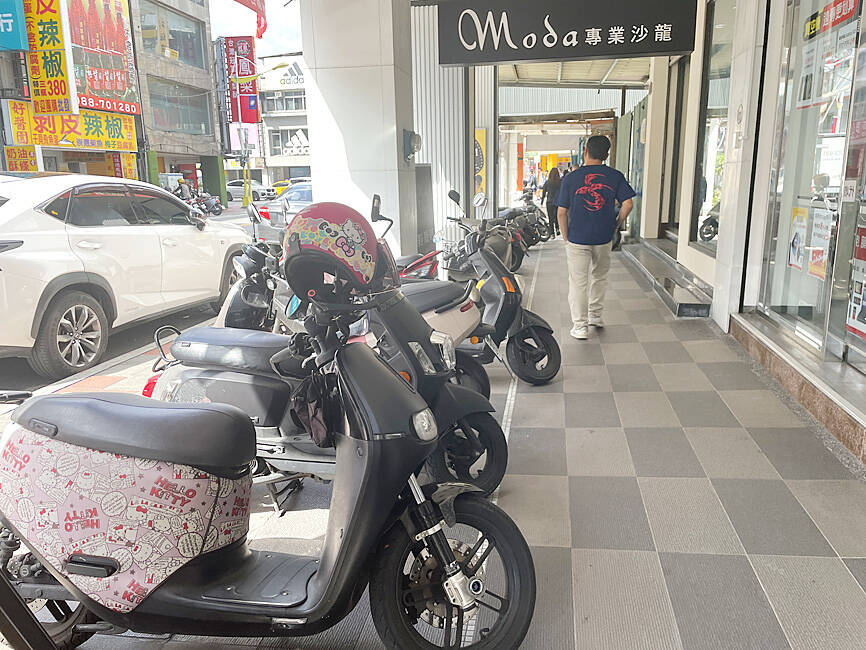The Executive Yuan yesterday approved amendments to the Road Traffic Management and Penalty Act (道路交通管理處罰條例) and a series of supporting measures, stipulating that drivers who commit “minor traffic violations” listed in the act would not receive demerit points and people would not be able to receive cash rewards for reporting minor violations.
Minor traffic violations refer to offenses that incur a fine of NT$1,200 or less.
They include not wearing a helmet when riding a motorcycle; talking on a mobile device while riding a motorcycle; smoking while riding a motorcycle or driving; and not heeding pedestrians when reversing.

Photo: CNA
Others are not having a guide when reversing large vehicles; stopping large vehicles on bridges, sidewalks, fast lanes, pedestrian crossings or in tunnels; and parking vehicles at intersections, within 10m of a public bus stop or 5m from a fire hydrant.
Other minor offenses include double-parking or parking against the flow of traffic; parking on bridges, sidewalks, pedestrian crossings, at crossroads, in tunnels, within 10m of public bus stops or within 5m of the entrance of a fire station; parking at entrances to airports, railway stations, ports, schools, entertainment venues, exhibition centers, stadiums, markets or in front of fire hydrants; and parking in spaces designated for use by disabled people.
The amendments were proposed to appease anger after the government on June 30 last year introduced a demerit points system to punish people who repeatedly commit traffic violations, the Ministry of Transportation and Communications said.
While the system has helped to reduce deaths from traffic accidents, reports of illegal parking surged, while demerit points were being given out at a great rate, the ministry said.
As people who accumulate 12 points in a 12-month period face suspension of their license for two months, some professional drivers complained that the system had affected their right to work, it said.
The system had also increased the workload for law enforcement personnel, as some regions do not yet have adequate parking spaces, making it more likely that drivers would contravene traffic regulations, it said.
Drivers who commit traffic offenses would still receive demerit points if they are stopped by law enforcement personnel, but they would not receive points if the offenses were reported by members of the public or captured by surveillance cameras, the ministry said, adding that drivers must still have points expunged by attending a defensive driving course.
The Executive Yuan also passed a draft pedestrian safety facility bill, which would require traffic authorities to move telecom boxes, mail boxes or fire hydrants if they impede traffic or pedestrians.
The owners of items that impede traffic would face fines of up to NT$150,000 for failing to address the issue within a designated period, the bill says.
People who modify or create obstacles on covered walkways or sidewalks without permissions would face a fine of up to NT$25,000, it says.

The CIA has a message for Chinese government officials worried about their place in Chinese President Xi Jinping’s (習近平) government: Come work with us. The agency released two Mandarin-language videos on social media on Thursday inviting disgruntled officials to contact the CIA. The recruitment videos posted on YouTube and X racked up more than 5 million views combined in their first day. The outreach comes as CIA Director John Ratcliffe has vowed to boost the agency’s use of intelligence from human sources and its focus on China, which has recently targeted US officials with its own espionage operations. The videos are “aimed at

STEADFAST FRIEND: The bills encourage increased Taiwan-US engagement and address China’s distortion of UN Resolution 2758 to isolate Taiwan internationally The Presidential Office yesterday thanked the US House of Representatives for unanimously passing two Taiwan-related bills highlighting its solid support for Taiwan’s democracy and global participation, and for deepening bilateral relations. One of the bills, the Taiwan Assurance Implementation Act, requires the US Department of State to periodically review its guidelines for engagement with Taiwan, and report to the US Congress on the guidelines and plans to lift self-imposed limitations on US-Taiwan engagement. The other bill is the Taiwan International Solidarity Act, which clarifies that UN Resolution 2758 does not address the issue of the representation of Taiwan or its people in

US Indo-Pacific Commander Admiral Samuel Paparo on Friday expressed concern over the rate at which China is diversifying its military exercises, the Financial Times (FT) reported on Saturday. “The rates of change on the depth and breadth of their exercises is the one non-linear effect that I’ve seen in the last year that wakes me up at night or keeps me up at night,” Paparo was quoted by FT as saying while attending the annual Sedona Forum at the McCain Institute in Arizona. Paparo also expressed concern over the speed with which China was expanding its military. While the US

SHIFT: Taiwan’s better-than-expected first-quarter GDP and signs of weakness in the US have driven global capital back to emerging markets, the central bank head said The central bank yesterday blamed market speculation for the steep rise in the local currency, and urged exporters and financial institutions to stay calm and stop panic sell-offs to avoid hurting their own profitability. The nation’s top monetary policymaker said that it would step in, if necessary, to maintain order and stability in the foreign exchange market. The remarks came as the NT dollar yesterday closed up NT$0.919 to NT$30.145 against the US dollar in Taipei trading, after rising as high as NT$29.59 in intraday trading. The local currency has surged 5.85 percent against the greenback over the past two sessions, central